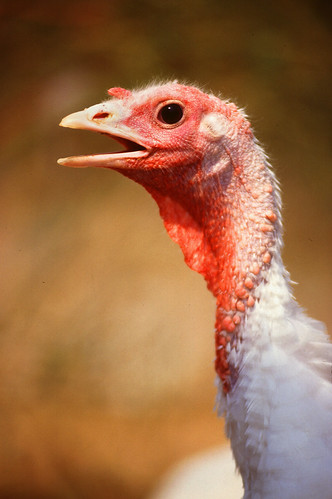
This post is part of the Science Tuesday feature series on the USDA blog. Check back each week as we showcase stories and news from USDA’s rich science and research portfolio.
Let’s talk turkey. You’re going to hear a lot about food safety as the Thanksgiving holiday approaches, but what you often don’t hear about is how U.S. Department of Agriculture (USDA) scientists are working to make turkey, chicken and other poultry products safer to eat long before they reach your table.
USDA Agricultural Research Service (ARS) scientists are developing alternatives to antibiotics that can help prevent turkey diseases and reduce bacteria such as Salmonella and Campylobacter—two of the main pathogens in poultry that cause foodborne illness in people.
While we depend on antibiotics to treat bacterial infections in people, it also is necessary to treat these infections in food animals. Through U.S. Food and Drug Administration guidance, USDA works with veterinarians and producers to be more judicious in their antibiotic use in food animals, while keeping them healthy and ensuring that our food supply remains safe. This is especially important because certain bacterial strains have become resistant to some of the current antibiotics used to treat infections in humans and animals, escalating the need worldwide to find and develop alternatives to antibiotics. Other USDA work in this area was covered last week during World Antibiotics Awareness Week.
For example, at the USDA-ARS Poultry Production and Products Safety Research Unit in Fayetteville, Arkansas, scientists are studying the effects of adding natural supplements such as yeast and vitamin D to turkey feed to help keep them healthy and control poultry diseases.
In one study, retired ARS microbiologist Geraldine Huff, physiologist Narayan Rath and their colleagues found that adding yeast extract to feed eaten by turkeys could help protect them against Clostridial dermatitis, a disease that causes lesions and sudden death in male turkeys. They concluded that feeding yeast extract—an inexpensive and widely available feed additive—to turkeys can help in managing the disease and keep turkeys heathy.
Finding alternatives to antibiotics has become a global issue as the demand for animal food products increases to meet the nutritional needs of a growing population. ARS scientists continue to seek solutions by developing new methods to control and prevent animal diseases and reduce bacterial pathogens in our food supply. Last week was World Antibiotics Awareness Week.
Using natural supplements is just one method ARS researchers are exploring to help improve the safety of turkey products that can be enjoyed Thanksgiving and the year round.
